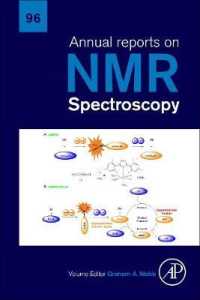- ホーム
- > 洋書
- > 英文書
- > Business / Economics
Full Description
In the rapidly evolving landscape of modern industry, staying ahead of the curve is not merely an advantage; it's a necessity. The transition from Industry 4.0 to Industry 5.0 represents a quantum leap in the way businesses operate and interact with technology. Industry 4.0 was characterised by the integration of digital technologies, automation, data analytics, and the Internet of Things (IoT) into manufacturing processes. Industry 5.0, also known as "human-centred industry" or "symbiotic industry," represents a shift from pure automation to greater collaboration between humans and machines, emphasising human skills, creativity, and problem-solving alongside advanced technologies.
Industry 5.0: Pioneering Business and Management Transformations aims to provide a comprehensive guide to understanding, preparing for, and thriving in the era of Industry 5.0. Key topics covered include Advanced Automation and AI Integration; Human-machine collaboration; Customisation and Personalisation; Data security and Privacy; Regulatory and Policy changes; and Sustainability and Ethical considerations. The book will appeal to academic researchers; students of business at undergraduate and MBA level; as well as business practitioners.
Contents
Chapter 1. Humanizing Industry 5.0: Creating Human-Centric Experiences; Peter V. Muttungal, Jossy P. George, and Benny Godwin J. Davidson
Chapter 2. Industry 5.0: A New Paradigm in Business and Management; Aruna Polisetty, Sowmya G, and Lalitha Nammi
Chapter 3. Explore the AI-Driven Decision-Making in a Volatile Business Environment: Impact on Operational Efficiency and Market Strategies; Manoj Babu P, Venkata Subbaiah P, and Natalia Kryvinska
Chapter 4. Envisioning the Challenges of Pharmaceutical Industry 5.0: An Argumentative Analysis; Sudhinder Singh Chowhan and Gyanendra Tripathi
Chapter 5. Ethical Consumerism and Its Impact on Fair Trade Practices; Jomon Jose M. and Jyothis Rachel Mathews
Chapter 6. Leadership Styles in Industry 5.0: Navigating the Human-Tech Interface; Geeta Sidharth and Angel Josy Lakra
Chapter 7. Automobile Perspectives with Industry 5.0 for Sustainable System and Assured Outcome with Reference to Skoda 2.0 Project; Vijit Chaturvedi, Sanjeev Bansal, Hari Sharma, and Tanya Duggal
Chapter 8. Human-Machine Collaboration for Organizations: A Review; Saurabh Tiwari and Manish Yadav
Chapter 9. Credibility, Engagement, and Purchase: How Virtual Influencers Drive Gen Z's Consumer Behaviour; Jossy P. George, Peter V. Muttungal, Benny Godwin J. Davidson, and Nishi Priya
Chapter 10. AI-Driven Insights: Revolutionizing Business Management; K. Susmitha, T.S. Leelavati, and Madhavi Sripathi
Chapter 11. The Challenges and Opportunities of Sustainability Practices: An Overview of the Indian Manufacturing Sector; Varun Kesavan and Aruna Polisetty
Chapter 12. AI in Business Management; Indranil Mutsuddi and Sulagna Das
Chapter 13. Examining the Perils of Deepfakes Technology; Sailaja Bohara, Gaurav Gupta, and Vikas Garg
Chapter 14. Sustainable Strategic Planning in Hospitality: Review of Current Literature and Emerging Research Directions; Madhu Kumari, Suneel Kumar, and Nisha Devi
Chapter 15. Sustainable Industrial Practices: India Leveraging Green Hydrogen for a Greener Future; Geeta Kichlu, Mandakini Das, Parinishka Chandi, and Prisha Kulshrestha
Chapter 16. Exploring the Impact of Personalized Customer Experiences in Modern Business Strategies; Venkata Subbaiah P, Sheela P, and Debora Dhanya Amarnath
Chapter 17. Exploring the Nexus between Corporate Social Responsibility and Climate Change: A Bibliometric Perspective; Neeru Sidana, Richa Goel, Ajay Sidana, and Dewanshi Ghosh








